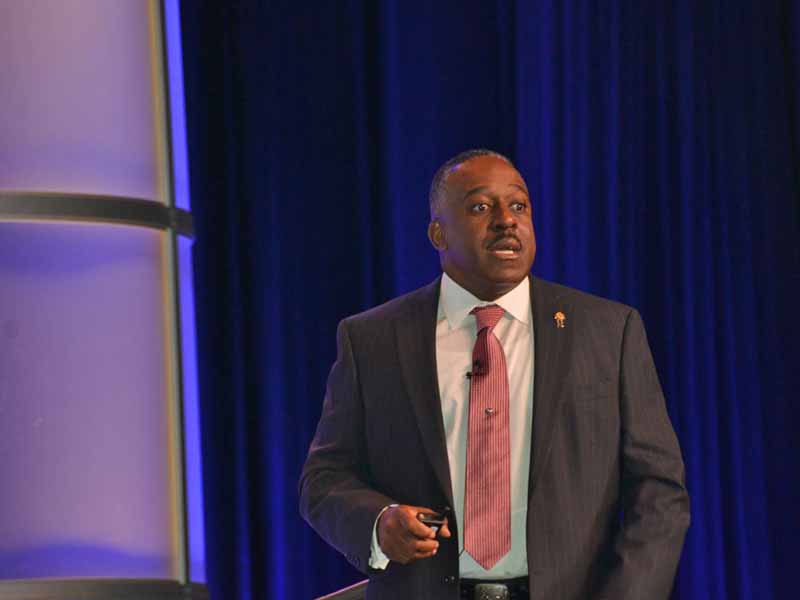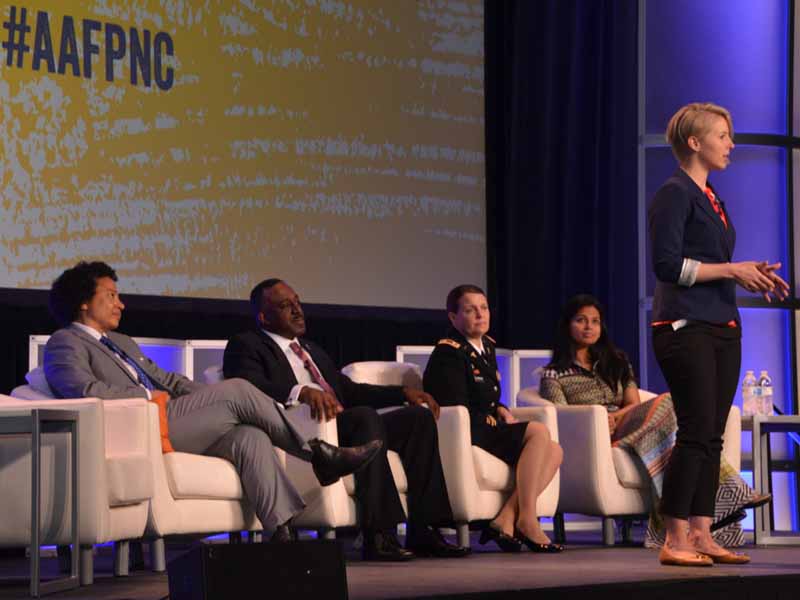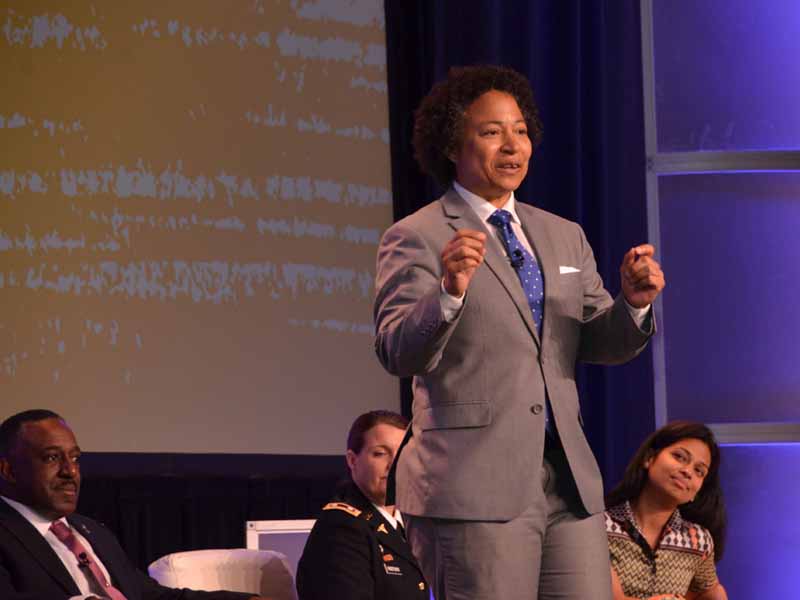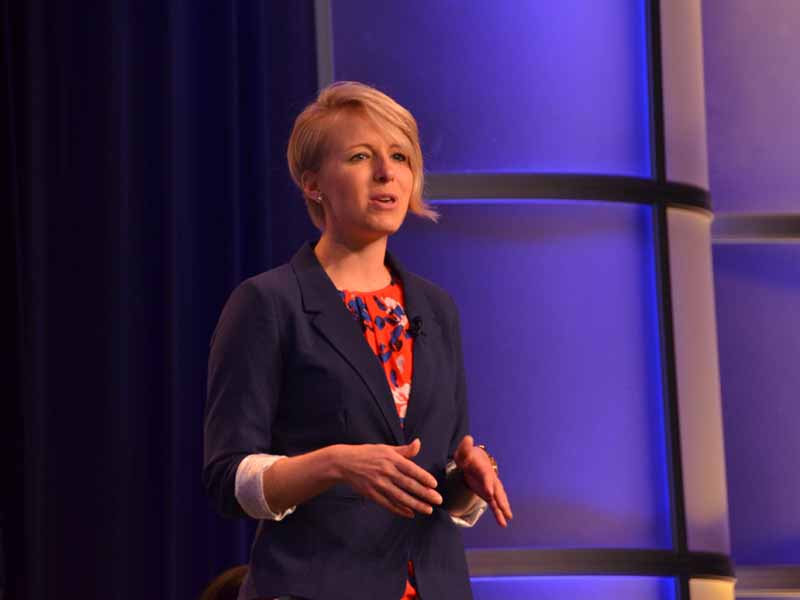Birth, Death, Hope and Money: Stories of Family Medicine
August 08, 2018 03:19 pm Scott Wilson Kansas City, Mo. – (Editor’s note: This story has been updated to clarify the case described by Lt. Col. Julie Hundertmark, M.D.)
Affirmation, aspiration, drama -- and a dollop of unabashed careerism -- launched the second day of the AAFP National Conference of Family Medicine Residents and Medical Students, in a main stage storytelling event titled "The Faces of Family Medicine."
"These stories represent what's out there but doesn't get spoken about as much as it should," said New York physician Anita Ravi, M.D., M.P.H., M.S.H.P., introducing the Aug. 3 morning panel. "A methadone client who learns she's pregnant and needs doctors to be on her side -- family medicine is the specialty of understanding the way in which her health connects to everything else going on in her life.
"Some people call these stories," she said. "We call them evidence. Every story we hear factors into what we call 'evidence-based medicine.' I love that."
Ravi, founder and clinical director of the PurpLE (Purpose: Listen and Engage) Clinic at the Institute for Family Health in New York, N.Y., told the crowd of hundreds how her approach to medicine has evolved.
"Family medicine specializes in the health of the community," she said. "We look at humans, but we also look at how humans interact with each other, how our community interacts. That's our specialty. We understand how it all connects."
Ravi went on: "I started my clinic to treat survivors of human trafficking, and it has expanded into a human-rights clinic because there was a need in the community. When I do rounds, my patients have been with lawyers and social workers. We take care of people seeking asylum. What I do is a different form of being Doctors Without Borders. We see what happens if you connect patients to a good outcome."

Eddie Richardson Jr., M.D., shares his story with attendees at the 2018 National Conference of Family Medicine Residents and Medical Students: "You can you do well in family medicine. Absolutely you can."
Paraphrasing the conference's theme, Ravi said, "You should 'picture yourself in family medicine,' but you should not let other people put the frame on that picture." With that, she introduced the panel's four speakers, each of whom showed how varied the frames can be.
Story Highlights
Taking Care of Anyone, Anywhere
"I married my next-door neighbor from Southwestern Kansas and became an infantry wife at 19," said Lt. Col. Julie Hundertmark, M.D., of Fort Benning, Ga.
"It was Army medicine taking care of me and my family," Hundertmark said, so when she decided to become a physician, she planned to serve. With the help of a scholarship program, she said, "I got down the dark tunnel of medical school and residency" to become a family medicine physician in the Army.
"Then graduation comes, and rainbows and ponies and sunshine, and six months later, I find myself in Mosul (Iraq). I am in a combat zone. There is fear with that. But my main fear was: Do I have the skill set to take care of whatever comes?"
Spoiler alert: She did.
"One night," Hundertmark said, "I heard a pounding on my door. Special Forces soldiers I hadn't met before needed my help. But why weren't they at the aid station, finding the doctor on call? Was this a mass casualty?"
Hundertmark had deployed alongside a gastroenterologist and a dermatologist, who, it turns out, were less practiced in the problem at hand. "We think we're having a baby," they told her.
"I'd lived here for several months," Hundertmark recalled onstage. "How did I miss a pregnant person?"
Complicating matters, the woman was being hunted by al-Qaeda.
"I see large fluid pockets on my tiny screen. I was trying to determine whether she was in labor," Hundertmark said.
The woman showed signs of polyhydramnios, and Hundertmark said she thought the birth might be imminent.
Her voice trembled a bit as she went on: "She told me she'd rather she and her baby die there, with me trying to help her, than take the risk of being killed outside."

Kari Mader, M.D., M.P.H., addresses audience members during a main stage panel at National Conference. Behind her, from left, are Renee Crichlow, M.D.; Eddie Richardson Jr., M.D.; Lt. Col. Julie Hundertmark, M.D.; and Anita Ravi, M.D., M.P.H., M.S.H.P.
Second spoiler alert: Nobody died in this story.
"To be the patient advocate there was special," Hundertmark said. "We had time -- two weeks -- to plan the delivery. And it was fun. I got to teach the medics how to suction a baby without gear. Finding Pitocin and vitamin K on the black market in Iraq? It can be done."
The audience laughed with appreciative relief and applauded on hearing that the baby was named after one of the soldiers who had gotten the woman in front of Hundertmark.
She told the crowd: "Family medicine physicians take care of everyone, doing everything, everywhere in the world."
Doing Well Doing What You Love
The next speaker, Eddie Richardson Jr., M.D., of Eatonton, Ga., reminded the audience that family physicians do all kinds of everything. For him, family medicine is the business of family -- and his family business.
"It starts at 5 years old for me," he said, talking about his double-amputee grandmother, whom he saw become increasingly infirm and slowly die. "I knew I wanted to be a physician, someone who helps people."
Richardson went on: "This meeting here is where I got the bug and wanted to be a family doc," he said, recalling his first AAFP National Conference. "I got nominated to be a student board member. That was a life-changing moment for me. It's also when I realized that medicine is a business."
Richardson has remained a leader ever since. He's past president and the current Board chair of the Georgia AFP. And he has sharpened his economic awareness into considerable acumen and a unique portfolio.
"Seven is a lucky number for me," he said, as the number glowed on a screen behind him. "The seven companies I own outside my practice have earned a total income of $75 million." Smiling, he let the figure sink in for a moment. "That's 'M,' for million."
The businesses, he explained, include a lab brokerage, a medical waste disposal company and a used-car dealership, along with significant stock holdings and a concierge medicine practice.
"You can do that," Richardson said. "You can you do well in family medicine. Absolutely you can. I've delivered over 600 babies, but I'm also a business executive and an entrepreneur."
And so is every physician, he added. "Don't let anyone tell you you'll be poor. You can enjoy what you do and take care of patients."
He paused, then said, "And get paid."
Caring for Patients Through Birth and Death
"I'm in academic family medicine, and we are the poorest paid, and my life is amazing," said the next storyteller, Renee Crichlow, M.D., of Minneapolis. "All my loans are paid, and I'm taking my mom to Greece next year."

Renee Crichlow, M.D., shares her experiences in academic family medicine: "Some choices we guide are mundane. Some are profound. All are awesome."
Then came the morning's second birth.
"The pager goes off," Crichlow said. "Some of us some of us still use pagers. Don't judge.
"I answer the page, and in the hospital I have the world's most gigantic intern. I assess his level of learning. I tell him, 'Let's get dressed, get our blues on, go toward the vagina.'
"So, giant intern, how many vacuums have you done?
"'None, Dr. Crichlow.'
"OK, we're going to do this one."
Crichlow went on: "For those of you who haven't done vac deliveries, the motion of your hand and arm is down and up." She pantomimed the gesture broadly. "But I'm noticing my elbow is above my head and I'm on my tiptoes. The bed is adjusted for my giant intern.
"We drop the bed, the baby's out, the mom's done screaming. The next day, my elbow was swelled like a grapefruit, and for two months I couldn't straighten my arm completely."
"The lesson is," she explained, "adjust the bed to your height."
Crichlow added, "It was a challenging birth. They need us then, not when it's easy." She paused before continuing.
"Trigger warning," she said. "Family medicine is about birth and death. Trigger warning: Life is about birth and death.
"On a day in July, another beep beep beep on the pager. It's an 82-year-old patient who has not tolerated a procedure and has left a DNR and a DNI if things don't go well. Vitals are unstable. Agonal breathing. The intern wants to know what to do.
"Call his nurse. Call his wife," Crichlow said.
"We go back to the room. We have these sheets for people on comfort care. They're beautiful. He's in the sheets. The nurse brushes his hair and takes out the extraneous tubes. She tells him his wife is coming. Hold on.
"His wife rolls in, past us, sits, grabs his hand, says, 'I love you, I love you, I love you, I love you,' says it for I don't know how long. And he dies."
Crichlow told the audience, "She asks if she can stay awhile. The nurse was crying. I was crying. The intern was crying.
"What that was, was a good death in a hospital," she said. "I can't think of a better way to die than with the person you love holding your hand and saying, 'You are loved.'"
She paused, the audience frozen.
"I am an academic family physician," she said. "Some choices we guide are mundane. Some are profound. All are awesome. It's who we are. It's what we do. It's awesome, and you should come join us."
"You Can Dream Even Bigger"
The last storyteller, Kari Mader, M.D., M.P.H., of Denver, bookended Ravi's enthusiasm with the story of another void-filling clinic started from scratch.
"I wanted to be able to take care of anyone who walked through my door," she said. "I didn't want to say no to anyone. I was a new doctor, living my dream, and my work was coming alive for me in Colorado.
"Then one day, a patient came to see me, a refugee from Burma, about my age. She'd had uncontrolled diabetes and high blood pressure and had already had two strokes. I remember sitting across from her in her wheelchair, a physical therapy belt holding her erect. Her face had a flat affect.
"I asked her, 'What do you eat in a normal day?'
"She said, 'My husband cooks for me, and I eat what he cooks for me, as long as he's not drinking.'"

Kari Mader, M.D., M.P.H., tells residents and students in the audience, "I didn't want to say no to anyone."
Mader went on: "Then she tells me he drinks every day.
"I asked her, 'How do you eat when he's drinking?'
"'My kids cook for me, but they only know how to cook rice.'
"If my heart could have left my body in that moment, it would have shattered on the floor," Mader said. "I felt hopeless, and it interfered with my ability to see patients."
She continued, "Then I got an email about a grass-roots effort. I went to the meeting, and out of the 25 to 30 people there, I knew only two people. The guy who had facilitated this conversation asked what we wanted to see happen in primary care in our community. And a narrative started to emerge.
"No. 1: All of us had been feeling this hopelessness, this restlessness to fix what our patients really needed, outside hospital walls. We had started to get frustrated but we also were now convinced that we were going to do work together. And we started to get a picture for how to do work on our community. We had a new sense of hope."
What emerged was a free, student-run clinic.
"That doesn't sound crazy, but it had been tried multiple times over the past 15 years and failed, for political reasons," Mader said.
"So, we went out and found every profession on campus to join us. In the end, not only did we get the university to say yes, we got money to build, in partnership with a local nonprofit. And I went from feeling, 'Can I really do this?' to being a family physician advocate, a community partner, an educator, someone who can be a voice for all my patients. We are the only specialty that can do that for anyone.
"Maybe, like me, at some point you have felt that high, got that vision: This is what I can be. Maybe you've questioned that feeling sometime on the way. Was I just naïve? Did I end up in the wrong space? Maybe someone told you that you were too smart for family medicine, told you that you were going to get buried under paperwork.
"You have the choice not to let that alternate narrative define your work. You can dream even bigger. You can be a researcher, an educator, an advocate, a community organizer."
Her fellow panelists nodded together.
"Do it for your patients," Mader said. "Reach out, grab onto it. Don't let anyone convince you otherwise."
Related AAFP News Coverage
2018 National Congress of Family Medicine Residents
Residents Tackle Tough Issues to Ensure Good Patient Care
(8/8/2018)
National Conference Opening Event
Panelists Recommend Looking Back to Move Forward
(8/8/2018)
2018 National Conference
Students, Residents Elect New Leaders for the Coming Year
(8/4/2018)
Additional Resources
2018 National Conference: Day Three(wakelet.com)